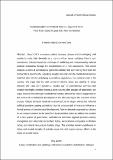Files in this item
Constitutionalism and political order in Libya 2011-2014 : three myths about the past and a new constitution
Item metadata
| dc.contributor.author | Geha, Carmen | |
| dc.contributor.author | Volpi, Frederic | |
| dc.date.accessioned | 2017-11-06T08:46:10Z | |
| dc.date.available | 2017-11-06T08:46:10Z | |
| dc.date.issued | 2016-08 | |
| dc.identifier | 241566259 | |
| dc.identifier | d8ec1fb3-d919-411a-ba31-9eb25a3f9137 | |
| dc.identifier | 84982975864 | |
| dc.identifier | 000381711700010 | |
| dc.identifier.citation | Geha , C & Volpi , F 2016 , ' Constitutionalism and political order in Libya 2011-2014 : three myths about the past and a new constitution ' , The Journal of North African Studies , vol. 21 , no. 4 , pp. 687-706 . https://doi.org/10.1080/13629387.2016.1165097 | en |
| dc.identifier.issn | 1743-9345 | |
| dc.identifier.uri | https://hdl.handle.net/10023/11989 | |
| dc.description.abstract | Libya’s 2011 revolution enabled ordinary citizens and an emerging civil society to voice their demands on a variety of key issues including Libya’s new constitution. Libyans faced the challenge of redefining and re-empowering national political institutions through the establishment of a new constitution. This article analyses a series of constitutional grassroots debates that were led by the Forum for Democratic Libya (FDL), thereby unpacking insights not only into the constitutional process itself but also into the underlying expectations regarding a new political order in the country. We argue that the brief period of relative peace and stability in Libya between 2011 and 2013 presents a ‘golden age’ of constitutional activities that created meaningful interface among Libyan citizens after decades of oppression. We argue however that although constitutional debates allowed for citizen engagement in the process of constitutional development it had little bearing on the outcomes of this process. Citizen demands remained unanswered due to deeply entrenched informal political practices causing activists to face the arduous task of trying to influence a formal process of constitutional development. Priority demands expressed by citizens in our research pointed to the need for Libyan political actors to address the creation of a new system of governance, civil liberties and three regional priorities namely immigration and citizenship in Southern Libya, reconciliation and justice in Western Libya, and natural resources in Eastern Libya. The priorities remain unaddressed in Libya and provide insights of priority issues that will require serious efforts in the future of a stable Libya. | |
| dc.format.extent | 21 | |
| dc.format.extent | 404945 | |
| dc.language.iso | eng | |
| dc.relation.ispartof | The Journal of North African Studies | en |
| dc.subject | Libya | en |
| dc.subject | Constitution | en |
| dc.subject | Arab uprising | en |
| dc.subject | Civil society | en |
| dc.subject | revolution | en |
| dc.subject | Dialogue | en |
| dc.subject | JF Political institutions (General) | en |
| dc.subject | SDG 10 - Reduced Inequalities | en |
| dc.subject.lcc | JF | en |
| dc.title | Constitutionalism and political order in Libya 2011-2014 : three myths about the past and a new constitution | en |
| dc.type | Journal article | en |
| dc.contributor.institution | University of St Andrews. School of International Relations | en |
| dc.identifier.doi | https://doi.org/10.1080/13629387.2016.1165097 | |
| dc.description.status | Peer reviewed | en |
| dc.date.embargoedUntil | 2017-11-05 |
This item appears in the following Collection(s)
Items in the St Andrews Research Repository are protected by copyright, with all rights reserved, unless otherwise indicated.

